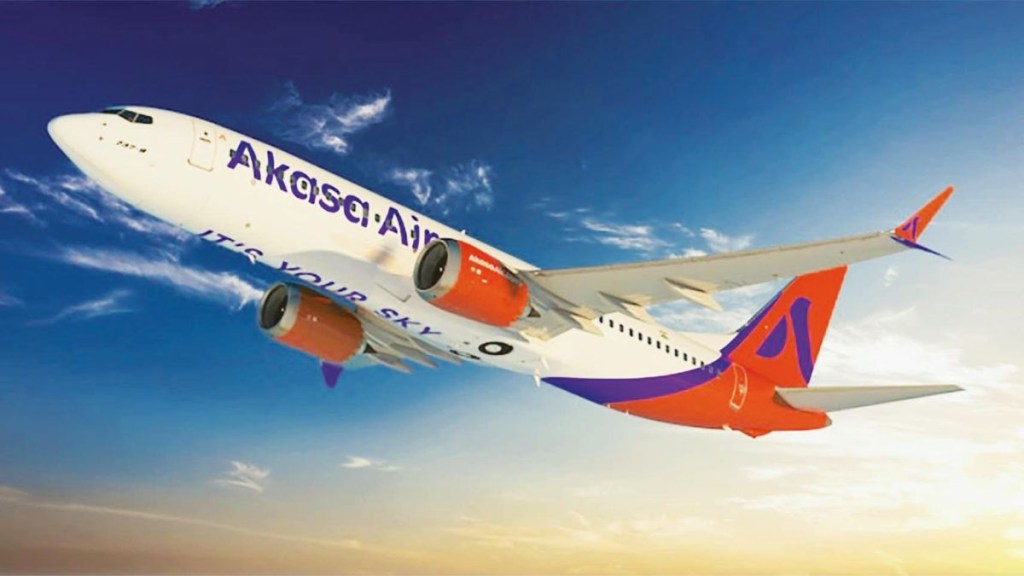So you are the eighth domestic airline, not counting regional ones. The number of seats for sale in the market are still 1.6 million below the pre-pandemic level. The number one player has an overwhelming 50%-plus share of the market. On the other hand, jet fuel prices are now over 10% lower from the peak in June 2022. Better still, the government has withdrawn the fare cap on air tickets imposed due to Covid-19 in 2020.
A good time to take off.
Akasa Air, whose first flight was on August 7, currently has just 0.39% of the market, but says it will scale up quickly, with one B737 MAX to be delivered every two weeks, an ambitious plan by all accounts. “Travel in India is a bit transactional at this point, and it can be intimidating,” says Belson Coutinho, co-founder, chief marketing and experience officer at Akasa Air, the airline looking to offer an “inclusive and humane travel experience”. “India needs an airline that is affordable, warm, dependable, an airline that creates an inclusive environment for every customer, whether it’s a first-time traveller or a frequent flyer,” he adds.
To start with, Akasa Air has undertaken quite a few initiatives to stand out — such as its crew uniform or in-flight meal packs made of sustainable materials. To stake a claim on being a pet-friendly service, the airline will allow domesticated dogs and cats onboard along with passengers from November 1. “Experience tells us the younger generation is very passionate about sustainability. As an airline that is building itself on one of the core values of sustainability, we hope that we’ll be able to connect with them much deeper,” he says.
Every airline has a meal service on board but for Cafe Akasa , it is about creating an experience. The onboard cafe offers a wide spread — from cakes, hot chocolate and sweet corn to bagels, burgers, salads and hummus. The pricing is competitive. The menu will be refreshed every three to four months.
Samit Sinha, managing partner, Alchemist Brand Consulting, says if Cafe Akasa delivers on the quality front, it will help differentiate Akasa Air from other airlines.
But will all this cut ice with the new-age flier?
Being human
Sinha says as an airline brand that is trying to break into a market with established players, Akasa Air needs to be mindful of three things — its capabilities, the relevance of its offering to the target segment and creating differentiation by addressing an unmet or partially met consumer need. What is critical is to first ensure that the hygiene factors are met with 100% competence and consistency. These include ticket pricing, flight schedule, punctuality, safety, and convenience, without which no amount of differentiation can help.
Coutinho says the brand promises to offer warm, efficient and affordable service across the consumer journey. “It starts from the way we hire our employees, from the way we’ve designed our website to our mobile app experience and payments. The overall theme is to keep it simple but relevant. The aim is to offer an environment in which the consumers can interact with the brand comfortably,” he says.
The airline brand has a customer listening, response and engagement centre, the Akasa Care Centre, which has voice, email and online reputation management support. This enables it to listen to consumer feedback across digital channels and social platforms. “Any airline typically generates tons of data; it’s about how you make use of the data,” Coutinho adds. “Brands that leverage and use data effectively will always stand out.”
The airline will expand its network across the country in a phased manner with a plan to connect tier 2 and tier 3 cities with 300 weekly flights by the month end. It hopes to have a fleet of 18 aircraft by end of March 2023. Over the next four years, the airline will add 54 additional aircraft, taking its fleet size to 72 aircraft.
Also Read: After Hours: Arnold Su, Business Head – Consumer & Gaming PC, System Business Group, ASUS India
